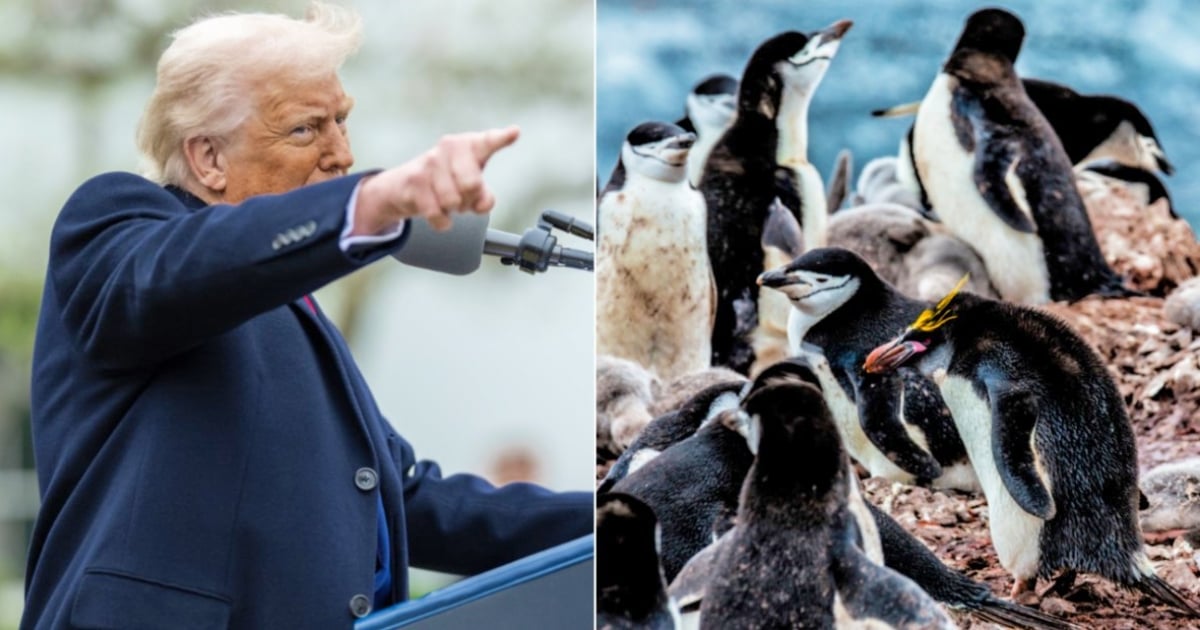In a surprising move that has baffled experts and governments alike, U.S. President Donald Trump has added uninhabited territories, devoid of economic activity and only home to wildlife, to his latest global tariff list. Among these are the remote Heard and McDonald Islands under Australian sovereignty, known for their ecological significance and solely populated by penguins, seals, and seabirds.
This decision, announced on Wednesday, is part of Trump's renewed protectionist rhetoric aimed at repositioning the United States in the international trade landscape.
The Curious Case of Heard and McDonald Islands
One of the most striking decisions is the inclusion of the Heard and McDonald Islands, a distant subantarctic archipelago under Australian control, with no human population or recognized economic activity. These islands, designated as a World Heritage Site, are home to thousands of penguins, seals, and sea birds. They lack infrastructure, do not engage in exports, and visits are strictly regulated for ecological reasons. Despite this, the Trump administration has imposed a 10% tariff on their supposed exports. The Australian government's official portal notes that due to the extreme isolation of these islands and persistent severe weather and maritime conditions, human activities have been and remain limited.
This policy also impacts other Australian territories like the Cocos (Keeling) Islands, Christmas Island, and Norfolk Island. The latter, with just over 2,000 residents, received a 29% tariff, higher than that applied to mainland Australia. Business owners in affected regions like Norfolk Island called the decision "inexplicable." Richard Cottle, who owns a concrete business, remarked it was a simple error. Another entrepreneur, involved in pest control, mentioned that the only known import from the U.S. is "rodent bait." According to Norfolk's Chamber of Commerce, in 2019, the island ranked 223rd in world exports, selling soybean meal and seeds worth 1.7 million dollars. However, in recent years, no significant trade activity with the U.S. has been identified.
Norway Also in the Crosshairs
Norway hasn't escaped the impact of this tariff policy either. The Arctic territory of Jan Mayen, an uninhabited volcanic island except for temporary military and scientific personnel, was hit with a 10% tariff, similar to the archipelago of Svalbard. In Svalbard, whose current economy focuses on tourism, nearly 3,000 people reside. Meanwhile, mainland Norway is facing a 15% tariff. Prime Minister Jonas Gahr Støre described the measure as "bad news." Official data shows that around 8% of Norwegian exports are destined for the United States.
British Military Territory Targeted
The British Indian Ocean Territory, home to the Diego Garcia military base, was also subject to a 10% tariff. This territory is exclusively populated by about 3,000 British and American military personnel and contractors. No exports are known from this enclave.
Geopolitical Contradictions: Absence of Tariffs on Russia, Cuba, and North Korea
One of the most significant criticisms of this measure is the exclusion of countries with tense relations or sanctions from Washington. Russia, Belarus, North Korea, and Cuba were not included in the list. "They already face sanctions that prevent any significant trade," justified the White House. However, in 2024, the United States imported more goods from Russia (3 billion dollars) than from Ukraine (1.2 billion), a country that did face punitive tariffs of 10%, according to U.S. Census data. This decision has raised suspicions of a selective and political rather than technical approach to trade policy. "Trump imposes no tariffs on Russia, but targets penguin islands," summarized a European media outlet.
Other Affected Territories: Tokelau, Gibraltar, and Réunion
The list also includes small and non-independent territories such as Tokelau (1,600 inhabitants), dependent on New Zealand; Gibraltar, a British territory claimed by Spain; and Réunion, a French overseas department with nearly 900,000 residents, which received a 37% tariff. The case of Réunion has been one of the most controversial due to the disproportionate tariff impact. Without a clear explanation, the decision affects a region fully integrated into European territory and with formal trade links with France and the European Union.
Symbolic Gesture or Real Impact?
Although many of these decisions lack practical effect, the gesture has been interpreted as a symbolic maneuver. Analysts agree that it's a way to strengthen Trump's nationalist and protectionist discourse without directly confronting economic powers with which the U.S. maintains strategic relations. From Australia and Norway to France, reactions have ranged from diplomatic surprise to logistical bewilderment. Meanwhile, penguins, seals, and seabirds of the Heard and McDonald Islands remain oblivious to their new status as symbolic actors in the strangest trade war of the century.
FAQs on Trump's Unusual Tariff Decisions
Why did Trump impose tariffs on uninhabited islands?
The tariffs are part of Trump's protectionist approach, aiming to reposition the U.S. in global trade. However, the inclusion of uninhabited islands has baffled many, as these territories have no recognized economic activity.
What is the impact of tariffs on the Heard and McDonald Islands?
Practically, the tariffs have little effect on the Heard and McDonald Islands due to their lack of human population and economic activity. The decision appears symbolic, emphasizing Trump's protectionist narrative.
How have other countries reacted to these tariffs?
Reactions have ranged from diplomatic surprise to logistical confusion. Countries like Australia and Norway have expressed bewilderment at the seemingly arbitrary nature of the tariffs.
